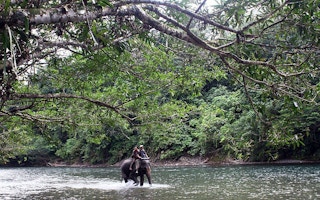After almost a decade of revision, Indonesia’s law on conservation is finally progressing on the national legislative agenda. Parliament (two commissions) in collaboration with six ministries and regional representatives are working to amend key laws. The work sends a strong signal to the public that conserving Indonesia’s valuable natural resources and ecosystems matters to the country.
The key conservation policy or Conservation Law (1990) is no longer adequate to address the growing threats to biodiversity. Ongoing threats such as habitat loss, illegal and unsustainable wildlife trade, and human-wildlife conflict, are now amplified by climate change. Meanwhile, rapid progress in information technology has changed the practices of illegal wildlife trade into an unprecedented scale through the massive use of social media. These are just two reasons of many others that underline the urgency of revising the law. At the heart of this urgency is a sad fact that extinction simply cannot wait.
With over 17,000 islands stretching 5,400 km along the equator, Indonesia is a fertile cradle for biodiversity and a home for many internationally renowned and charismatic species, such as orangutans, whale sharks and komodo dragons. Its 120.5 million hectares of forest help 37.2 million people earn a living, while at the same time playing a critical role to mitigate the adverse impacts of climate change.
Recognising the extensive need for major economic-driven activities like agricultural expansion, mining, and infrastructure development, Indonesia’s government pushes efforts to balance it without sacrificing conservation. In 2011 the government issued a forest moratorium policy, coupled with other regulations to curb deforestation. The deforestation rate has been consistently decreasing for the past four years compared to 2018. Under Indonesia’s conservation law, all species included in the protected list are prohibited from commercial use, whereas the non-protected species can be exploited under certain terms and conditions. In 2018 the government added 227 new species to the list meaning 904 species have been protected and prioritised in the government’s conservation programs.
But the challenges in nature and biodiversity conservation have become increasingly complex. Understandably, the legal context set up three decades ago is less effective today as demand grows for natural resources to support the world’s human population.
The revised conservation law should include actions addressing the core values of conservation such as protecting wildlife and habitats, minimising human impact on the environment, promoting sustainable development and utilising resources responsibly. Taken together, this reform could ensure that ecosystems stay intact and species in decline can recover. It’s also an opportunity to mitigate pathogen spillover that can lead to pandemics such as Covid-19.
The harvest of a species from the wild should be limited and be science-based, respect the breeding season, and most importantly, be traceable.
New developments in science and technology can complement conservation efforts. Various monitoring technologies, from remote sensing to track forest cover, to GPS collars to understand a species’ ranging pattern, are useful to enable conservation and sustainability targets. There are also many modelling approaches to map the extent and distribution of biodiversity.
There could also be space in the law for public participation in research and monitoring. Citizen science can help the government in collecting the data and information needed for managing and conserving Indonesia’s biodiversity.
The more people can be engaged in conservation efforts, the closer we can get to sustaining the planet’s support system for biodiversity and humanity.
Noviar Andayani is a lecturer at the Department of Biology, Faculty of Natural Science and Mathematics at the University of Indonesia.
Originally published under Creative Commons by 360info™.








